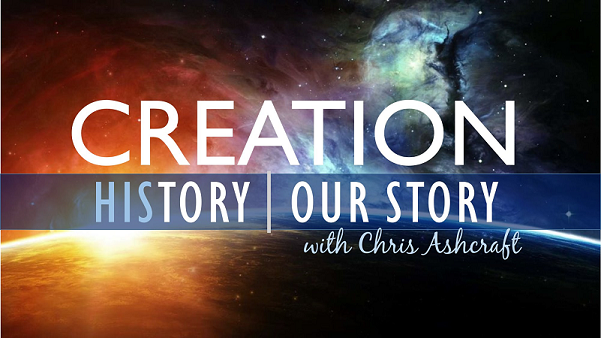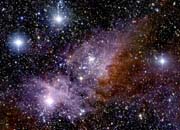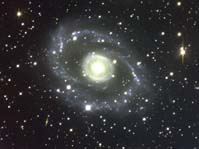Receive Event
Announcements
Live
Classes

At
Cedar Park Church
and Evergreen Baptist
Online
Course

Subscribe


Search
Astronomy Resources in Creation Science
Astronomy
by the CreationWiki
Organizations of Christian Astronomers
Creation Astronomers
Astronomy Articles from the Creation
Perspective
-
The Angular Size of the Moon and Other Planetary Satellites: An Argument
For Design by Danny Faulkner,
Creation Research Society Quarterly 35(1) June 1998.
-
Astronomical Problems Oard, M.J., 1995. Creation Ex Nihilo Technical
Journal 9(1):5–6
-
Astronomy FAQ by Answers in Genesis
-
Astrophysical Science from
In the Beginning by Walter Brown
-
Comets and the Age of the Solar System by Danny Faulkner,
Journal of Creation 11(3):264–273, December 1997.
-
The Current State of Creation Astronomy by Danny Faulkner (4th
International Conference on Creationism, 1998)
-
Extrasolar planets suggest our solar system is unique and young by
Rod Bernitt,
Journal of Creation 17(1):11–13, April 2003.
-
Toward a Creationist Astronomy by Danny Faulkner,
Creation Research Society Quarterly 28(3) December 1991.
-
The young faint sun paradox and the age of the solar system by Danny
Faulkner
-
Unhidden by Don Richardson, Xulon Press, 2009, 228 pages.
ISBN:978-1607912453
-
A
Simplified Explanation of the Setterfield Hypothesis by Helen
Fryman and Barry Setterfield
-
The Angular Size of the
Moon and Other Planetary Satellites: An Argument For Design by Danny R. Faulkner. CRSQ
Volume 35(1) June 1998
-
Astronomical and Physical
Sciences from In the Beginning
by Walter Brown
-
Astronomy by Mike Brown
-
Astronomy in the Bible
by the Catholic Encyclopedia
-
Astronomical Evidences for the God of the Bible Hugh Ross
-
Astronomical Problems by
Michael Oard, Journal of Creation 9(1):5–6, 1995
-
The Big Bang Theory Collapses
by Duane Gish. ICR Impact 216
-
The Christmas Star
by
Hugh Ross
-
The Christmas Star:
Was it Astronomical or Was it a Miracle? by Daniel Harris PhD
-
Comets and the Age of the
Solar System by Danny Faulkner, Journal
of Creation 11(3):264-273, 1997
-
The Current State of
Creation Astronomy by Danny Faulkner. Presented at the Fourth
International Conference on Creationism
Pittsburgh, PA, August 3-8, 1998 -
Do
stars evolve? Adapted by Christian Answers Network from Don DeYoung's book
Astronomy and the Bible
- Does
God Expect Man to be Able to Tell Time? The Age of
the Earth & the Future of the Earth by James Sundquist
-
The Dubious Apologetics of Hugh Ross by Danny Faulkner.
Journal of Creation 13(2):52–60
November 1999.
-
The Earth's Magnetic Field: Closing a Loophole in the Case of its Youth
by Russell Humphreys. Creation Matters 7(2) March/April, 2002.
-
Geomagnetism and the Age of the Solar System PowerPoint presentation
by Wayne Spencer
-
Ghost Craters in the Sky:
Is the Man in the Moon Telling Us Something? by Helen Fryman. Creation Matters, January/February 1999.
-
The Heavens by Accuracy in Genesis
-
The Moon: The Light that Rules the Night Jonathan Sarfati. Creation 20(4):36–39,
September–November 1998
-
More problems for the ‘Oort comet cloud’? by Danny Faulkner, Ph.D. Journal of Creation
15(2):11
August 2001
-
 The
Origin of the Solar System
by Lambert Dolphin
The
Origin of the Solar System
by Lambert Dolphin
-
Our Amazing Solar System Wayne Spenser's introduction to the solar system
from a young age creation point of view.
-
Planets Around Other Stars? by Wayne Spenser
-
Revelations in the Solar System Part 1 Wayne Spenser addresses problems with evolutionary
views and new findings from the Galileo mission.
Part
2 suggests some creationist alternatives to the usual evolutionary
naturalistic view of the solar system.
-
The Role Of Stellar Population Types In The Discussion
Of Stellar Evolution by Danny R. Faulkner. CRSQ Volume
30(1) June 1993
-
Short Period Comets, by Jon Covey
-
The Sun Our special star by Jonathan Sarfati, Creation 22(1):27–30
-
Toward A Creationist Astronomy by Danny R. Faulkner and Don B. DeYoung.
CRSQ Volume 28(3) December 1991
-
What
Holds The Universe Together?
by Lambert Dolphin
-
The Young Faint Sun Paradox and the Age of the
Solar System by Danny Faulkner, ICR Impact No. 300.
Astronomy News
-

No place like home: Our lonesome solar system
by Lee Billings. May
11, 2011 -
Gliese 581g, Newly Found 'Habitable' Planet, May Not Exist Francesco
Pepe, who works with the Geneva Observatory and used the HARPS
instrument on the La Silla telescope at the European Southern
Observatory in Chile, said he and his team could not find the planet or
confirm its existence. Epoch Time, Oct 12, 2010.
-
Freshly Discovered Earth-Like Planet Orbiting Nearby Star Could Be the
First Truly Habitable Exoplanet A couple of math geeks recently
calculated that the discovery of the first “habitable” exoplanet would
be announced in May of next year -- but a few stargazers from UC Santa
Cruz and their colleagues simply couldn’t wait that long. By Clay Dillow
Posted 09.29.2010. Popular Science.
-
Big Bang Was Followed by Chaos, Mathematical Analysis Shows Seven
years ago Northwestern University physicist Adilson E. Motter
conjectured that the expansion of the universe at the time of the big
bang was highly chaotic. Now he and a colleague have proven it using
rigorous mathematical arguments. ScienceDaily. Sep. 8, 2010.
-
Stephen Hawking says universe not created by God Physics, not
creator, made Big Bang, new book claims. Professor had previously
referred to 'mind of God'. guardian.co.uk. September 2, 2010
-
Fate of Universe revealed by galactic lens Researchers conclude that
the Universe will probably expand forever ending in a dead wasteland
with a temperature approaching what scientists term ‘absolute zero’. BBC
News, 19 August 19, 2010
-
Search for Intelligent Aliens Takes Center Stage This Weekend at SETIcon
SETI Institute celebrates the 50th anniversary of its mission to scan
the universe for signs of intelligent extraterrestrial life. Space.com,
August 12 2010.
-
Chlorine study suggests moon is dry after all The moon's interior
may not be that wet after all, despite some recent studies that have
suggested otherwise. A new analysis of Apollo rocks backs the old idea
of a waterless world. NewScientist. August 2010.
[1]
-
Nemesis reconsidered. An astrophysicist and a paleontologist, after
re-examining the fossil record, now propose abandoning the Nemesis
hypothesis, on the theory that any companion star to the Sun ought to
have had its orbit changed in the last 500 million years and thus could
not have caused extinction-level events as regularly as clockwork during
that time. Solar and Stellar Astrophysics. July 2, 2010.
-
Evidence for dark matter and energy found lacking. A team of
astronomers at Durham University (UK) re-examined the data from the
Wilkinson Microwave Anisotropy Probe (WMAP) and found that
previously-described evidence for an acceleration effect due to dark
energy is nothing more than an error of measurement. Creationism
Examiner. June 15, 2010.
-
'Dark' matter and energy 'proof' exaggerated—again. Astronomers find
the same apparent ratio of "dynamical" to "luminous" mass at the edge of
the universe as near to us. As ever, they insist that this somehow
"proves" the existence of "dark matter"—when in fact it proves no such
thing. Creationism Examiner, 26 January 2010
-
Mystery of
extrasolar planets' eccentric orbits -evidence suggests that, as far
as planetary systems go, our solar system might be special indeed. April
19, 2005
-
Discovery By UCSD Astronomers Poses A Cosmic Puzzle: Can A 'Distant'
Quasar Lie Within A Nearby Galaxy? An international team of
astronomers has discovered within the heart of a nearby spiral galaxy a
quasar whose light spectrum indicates that it is billions of light years
away. January 10, 2005
-
Glimpse At
Early Universe Reveals Surprisingly Mature Galaxies
A rare
glimpse back in time into the universe's early evolution has revealed
something startling: mature, fully formed galaxies where scientists
expected to discover little more than infants.
Space Daily 7/8/04
-
Massive Black Hole Stumps Researchers -
astronomers have found a colossal
black hole so ancient, they're not sure how it had enough time to grow
to its current size 6/28/04
-
Newly Discovered Baby Planet Confounds Expectations - Raw Materials
For Habitable Planets Around Surprisingly Young Stars. 6/11/04
-
Dust rocks
martian river theory -
Signs of water may really be slumping sand.
Nature Science Update 5/25/04
-
Sizing up the
Universe Microwave mismatch proves our cosmos is a whopper. Nature
5/18/04
-
Researchers confirm theory that universe in rapid expansion Space
Daily 5/18/04
-
Study May Cast
Doubt On Some 1996 Evidence Of Past Life On Mars Space Daily 5/06/04
-
NASA
announces evidence for water on Mars by Answers in Genesis 3/4/04
-
Top 10 Space Mysteries for 2003 - The origin of
life Yahoo News 12/27/02
-
Star of Bethlehem- Going Back in Time to Examine
Its Origins
12/23/02
-
Seeing red - revolutionary probe gears for Martian
exploration
News on upcoming mission to search for life on mars 12/19/02
-
Hubble Watches Galaxies Engage In Dance Of Destruction 12/17/02
-
Christian Astronomers Mend Rift With Science and
Religion Aug 8, 2000

 The
Origin of the Solar System
by Lambert Dolphin
The
Origin of the Solar System
by Lambert Dolphin


